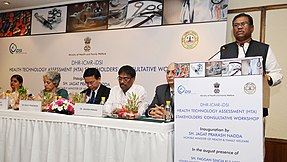
Health technology assessment (HTA) is a multidisciplinary process that uses systematic and explicit methods to evaluate the properties and effects of a health technology.[1] Health technology is conceived as any intervention (test, device, medicine, vaccine, procedure, program) at any point in its lifecycle (pre-market, regulatory approval, post-market, disinvestment).[2] The purpose of HTA is to inform "decision-making in order to promote an equitable, efficient, and high-quality health system".[3] It has other definitions including "a method of evidence synthesis that considers evidence regarding clinical effectiveness, safety, cost-effectiveness and, when broadly applied, includes social, ethical, and legal aspects of the use of health technologies. The precise balance of these inputs depends on the purpose of each individual HTA. A major use of HTAs is in informing reimbursement and coverage decisions by insurers and national health systems, in which case HTAs should include benefit-harm assessment and economic evaluation."[4] And "a multidisciplinary process that summarises information about the medical, social, economic and ethical issues related to the use of a health technology in a systematic, transparent, unbiased, robust manner. Its aim is to inform the formulation of safe, effective, health policies that are patient focused and seek to achieve best value. Despite its policy goals, HTA must always be firmly rooted in research and the scientific method".[5]
- ^ O'Rourke, Brian; Oortwijn, Wija; Schuller, Tara (June 2020). "The new definition of health technology assessment: A milestone in international collaboration". International Journal of Technology Assessment in Health Care. 36 (3): 187–190. doi:10.1017/S0266462320000215. ISSN 0266-4623. PMID 32398176. S2CID 218617518.
- ^ "The International Network of Agencies for Health Technology Assessment". INAHTA. Archived from the original on 2021-10-27. Retrieved 2021-10-27.
- ^ "The International Network of Agencies for Health Technology Assessment". INAHTA. Archived from the original on 2021-10-27. Retrieved 2021-10-27.
- ^ Luce BR, et al. (2010). ". EBM, HTA, and CER: clearing the confusion". Milbank Q. 88 (2): 256–76. doi:10.1111/j.1468-0009.2010.00598.x. PMC 2980346. PMID 20579285.
- ^ EUnetHTA (European network for Health Technology Assessment) https://www.eunethta.eu/about-eunethta/ Archived 2021-01-17 at the Wayback Machine